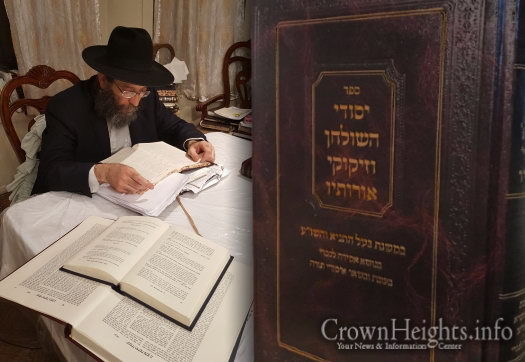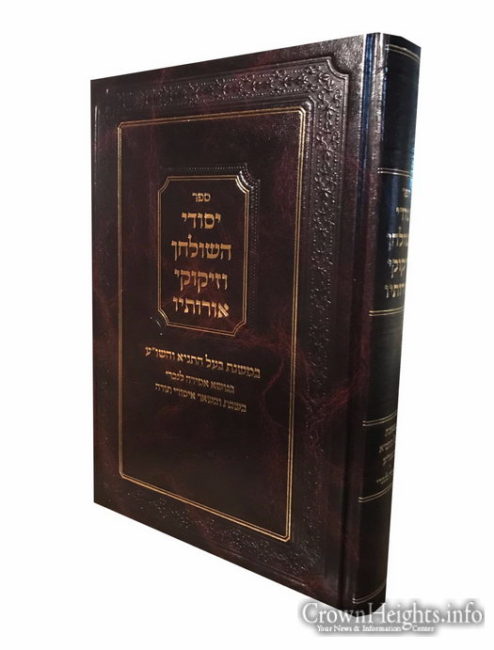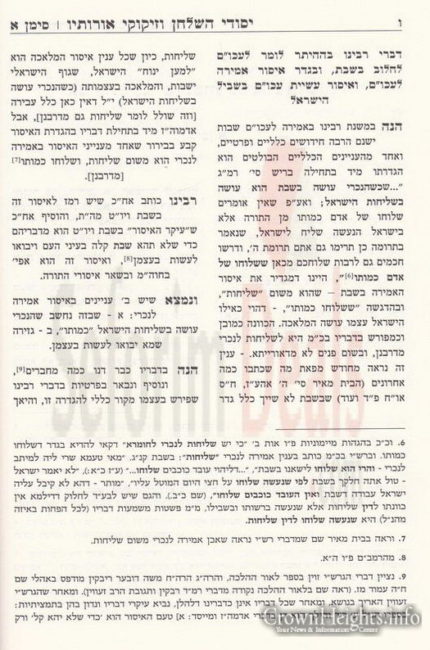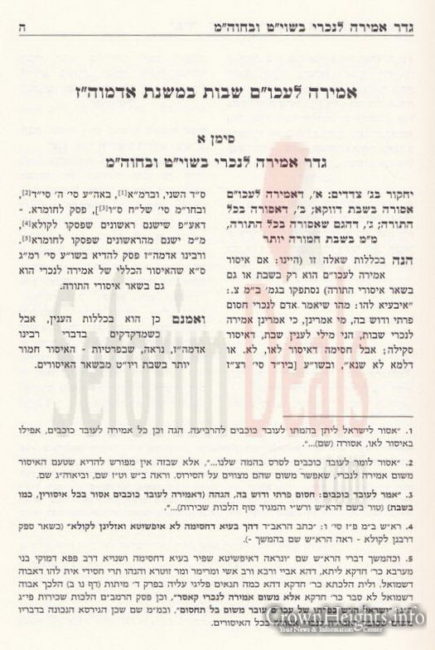
New Sefer Brings Clarity to ‘Amira Lenochri’
Can I Ask a Non-Jew to Turn Off a Light on Shabbos? The question is a common one. The answer: not so simple. A new Sefer, authored by Rabbi Shmuel Zajac of Crown Heights, seeks to bring some Halachic clarity to the subject.
Rabbi Shmuel Zajac is a renowned Maggid Shiur at Yeshivas Tomchei Temimim in Morristown, NJ. In this new Sefer, he explains the complex topic of Amira Lenochri on Shabbos.
The Sefer, titled “Yesodei Hashulchan Vezikukei Orosov,” focuses on the Alter Rebbe’s rulings regarding Amira Lenochri on Shabbos. The author, who is well known for his in-depth Shiurim and scholarly dissertations, explains the foundations upon which the Alter Rebbe based his rulings in the Shulchan Aruch, and also uncovers the novel insights that can be gleaned from them.
Released just in time for this week’s Kinus Hashluchim, the new Sefer is decorated with approbations from leading Rabbis and Halachic authorities in the US and Israel. Rabbi Asher Weiss, a renowned Posek in Jerusalem writes, “the greatness and extraordinary depth of the Shulchan Aruch Harav are well known . . . few scholars are successful at grasping this depth fully. I was therefore very pleased and impressed with how the author explains these complicated topics so thoroughly and logically.” In an especially enthusiastic approbation, Rabbi Meir Heisler, Rosh Yeshivah of Yeshivas Emek HaTalmud in Jerusalem, praises the Sefer as “an incredible innovation in our generation,” and adds his own scholarly comments.
The Sefer is especially suitable for Yeshivah students, Kollel Yungerleit, and Rabbonim who wish to learn the Halachos of Amira Lenochri from the Alter Rebbe’s Shulchan Aruch in depth.
The Sefer is available in Seforim stores, and directly from the publisher at info@seforimdeals.com.
















Anonymous
Rabbi Shmuel Zajac is a very deep thinker on Torah and I’m glad to hear of his book.
P.S. His son Reb Nochom is my friend
Special man.
Rabbi Zajac is a very special man, I Still Remember those zappers going all those years back in Chovevei.
Milhouse
Can I Ask a Non-Jew to Turn Off a Light on Shabbos? The question is a common one. The answer: not so simple.
Actually the basic answer that covers the vast majority of cases is simple, and consists of two words: “Generally, no”. Where it gets complicated is if you want to know all the exceptions. But for most people, most of the time, “no” is sufficient. You may not generally ask, hint, or otherwise have a non-Jew to do for you what you may not do yourself, and in fact you must do whatever is in your power to prevent him from doing so. If he’s your employee you must tell him not to, and if he disobeys the instruction you must fire him. But there are exceptions, and that’s where it’s indeed not so simple, and R Zajac’s sefer comes in handy. These are halochos that everyone ought to know, because if you have one of those exceptions you can’t always run to the rov to ask a shayla.
Anonymous
Great sefer to have.
Not a topic that was explored in depth before.
If I may make a suggestion of a topic not explored: halachos and ethics about speaking about people who have already passed away. The dos and do nots.
Milhouse
It’s really very simple: Treat everybody the same, whether they are alive or dead. There is no difference; a person is a person.
It is a basic principle of the common law that one cannot slander the dead; once a person is dead he has no more need for a reputation and no feelings to be hurt, so it doesn’t matter what you say. Similarly once someone is dead, even if he still exists in another world, he has no further use for his body, is unaware of what happens to it and wouldn’t care if he did know, so it doesn’t matter how we treat it.
Judaism rejects this principle. We believe not only that the dead continue to live in another world, but also that they are aware of what happens to their bodies and hear whatever is said at their graves, and that they care about it. Dead people have feelings too. Therefore we have no right to cut someone up or burn them just because they’re dead, and slandering them or hurting their feelings is just as offensive as it is to anyone else. But if you wouldn’t hesitate to say something about a living person, there’s no reason to hesitate just because they’re dead.
Anonymous
Great topic for a sefer.
Not a well explored one until now.
I’d love to see more.
A series of such non explored ones.
May I suggest for next one the dinim and ethics about speaking of those who have already passed away.
The dos and dont’s so to speak.
Wishing you much success.
(Former) Talmid
Rabbi Zajac injects a true love for Torah – havanah v’hasaga through real yegiya! A true model and facilitator for the high standard the Rebbe set forth for our learning. Glad to see his work published. Next is the paperlach!
Lawrence
Rabbi Zajac’s Sefer makes no pretention at claiming it is a Halacha Sefer
It is a lomdisher mehaleich in the issues based on and from the Poskim
There are Seforim in English published by various USA publishing houses which systematically deal with practical applications.
Highly recommended.
This Sefer is not for people like that
It is for yoshvei ohel (not the OHEL) and Benei HaKollelim
English or youtube
a few concise summaries for the masses, or some shiurim online would be greatly appreciated.
Peretz
Mazal Tov! This is a great idea to bring this topic to attention. Unfortunately, many are lenient in “asking a goy” and it is (as mentioned prior) “generally, no”.
Moreso, it is “very seldom, Yes”.
Yashar koach to Rabbi Zajac for bringing his sefer to the public.